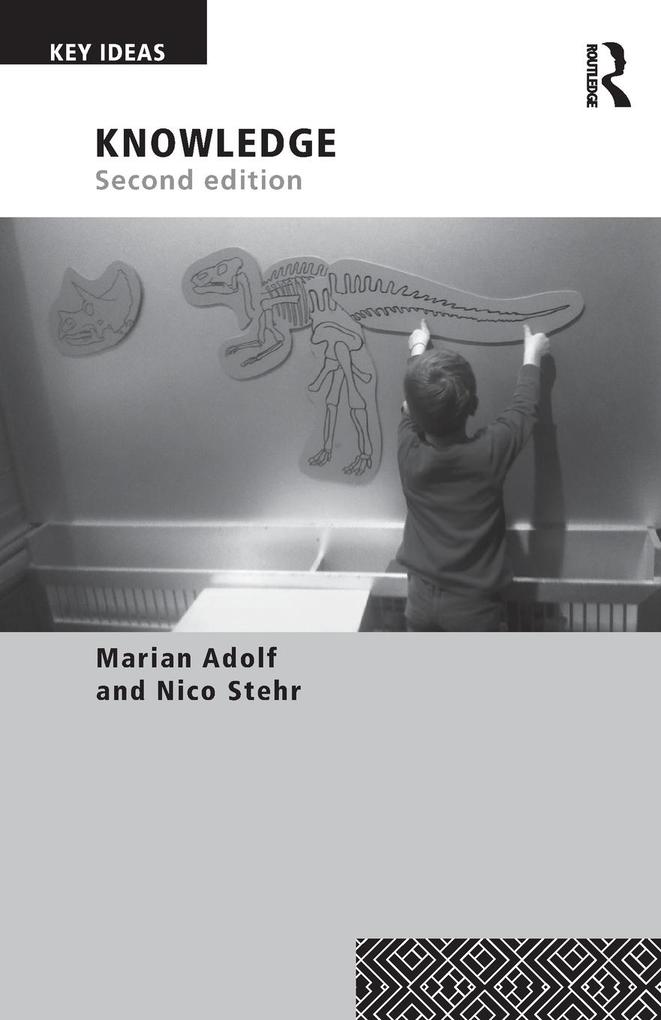Bücher versandkostenfrei*100 Tage RückgaberechtAbholung in der Wunschfiliale
Ihr Ostergeschenk: 15% Rabatt auf viele Sortimente11 mit dem Code OSTERN15
Jetzt einlösen
mehr erfahren
Zustellung: Sa, 12.04. - Mi, 16.04.
Versand in 6 Tagen
VersandkostenfreiBestellen & in Filiale abholen:
Talk of knowledge is ubiquitous in the modern world. Whether we talk of know-how, innovation or education, knowledge is always involved. But despite its prominence, knowledge often remains nebulous. This book explores the category of knowledge from a sociological perspective, and traces the concept of knowledge as the very fabric of modern society.
As we move through our modern world, the phenomenon we call knowledge is always involved. Whether we talk of know-how, technology, innovation, politics or education, it is the concept of knowledge that ties them all together. But despite its ubiquity as a modern trope we seldom encounter knowledge in itself. How is it produced, where does it reside, and who owns it? Is knowledge always beneficial, will we know all there is to know at some point in the future, and does knowledge really equal power? This book pursues an original approach to this concept that seems to define so many aspects of modern societies. It explores the topic from a distinctly sociological perspective, and traces the many ways that knowledge is woven into the very fabric of modern society.
Inhaltsverzeichnis
Preface
Introduction
1. Classical Conceptions of Knowledge
2. Knowledge about Knowledge
2.1. Attributes of Knowledge
2.2. Knowledge as a Capacity to Act
2.3. Knowledge and Information
2.4. Practical Knowledge
2.5. Additional Knowledge
2.6. The Uneven Development of Knowledge
2.7. The Limits of the Growth of Knowledge
2.8. A Sociological Concept of Knowledge and its Context
3. The Knowledge of the Powerful
3.1. Knowledge is Power and Power is Knowledge
3.2. The Iron Law of Oligarchy
3.3. Knowledge/Power
3.4. The Global Class
4. Non-knowledge
4.1. Sigmund Freud and Friedrich August von Hayek
4.2. Observations about Non-Knowledge
4.3. Non-knowledge as a Myth?
4.4. Non-knowledge
4.5. Ignorance
4.6. Knowledge Gaps
4.7. Non-knowledge about Non-knowledge
5. Policing Knowledge
5.1. The Self-realization of Knowledge
5.2. The Self-protection of Knowledge
5.3. Knowledge becomes Superfluous
6. Forms of Knowledge
6.1. Everyday Knowledge
6.2. The Power of Everyday Knowledge
6.3. Indigenous or Traditional Knowledge
6.4. Tacit Knowledge
7. Global Knowledge
7.1. Basic Reflections on Global Knowledge
7.2. Global Knowledge Worlds
7.3. Structures of Global Knowledge Spaces
7.4. Forms of Global Knowledge Worlds
7.5. Attributes of Knowledge that Promote Globalization
7.6. Limits to the Globalization of Knowledge
7.7. The Project of Worldwide Worlds of Knowledge, and the Doubts about its Likelihood
8. Digital Worlds and Knowledge/Information
8.1. Information, Communication and Technology
8.2. Societal Communication and Shared Knowledge
8.3. Analyzing the Ubiquity of the Media: Mediatization
8.4. New Media, Old Media and the Hybrid Media System
8.5. ITC's, Surveillance and Knowledge
8.6. Communication, Media and Knowledge
9. Functions of Knowledge
9.1. Knowledge as Power and Authority
9.2. The Power of Ideas
9.3. Knowledge and the Economy
9.4. Knowledge as Property and Public Good
10. The Price of Knowledge
10.1. Human Capital
10.2. Symbolic Capital
10.3. Patents
10.4. Taxation
11. The Benefits of Knowledge
11.1. The Distribution of Knowledge
11.2 Knowledge, Power and Participation
11.3. The knowledge society
Bibliography
Index
Introduction
1. Classical Conceptions of Knowledge
2. Knowledge about Knowledge
2.1. Attributes of Knowledge
2.2. Knowledge as a Capacity to Act
2.3. Knowledge and Information
2.4. Practical Knowledge
2.5. Additional Knowledge
2.6. The Uneven Development of Knowledge
2.7. The Limits of the Growth of Knowledge
2.8. A Sociological Concept of Knowledge and its Context
3. The Knowledge of the Powerful
3.1. Knowledge is Power and Power is Knowledge
3.2. The Iron Law of Oligarchy
3.3. Knowledge/Power
3.4. The Global Class
4. Non-knowledge
4.1. Sigmund Freud and Friedrich August von Hayek
4.2. Observations about Non-Knowledge
4.3. Non-knowledge as a Myth?
4.4. Non-knowledge
4.5. Ignorance
4.6. Knowledge Gaps
4.7. Non-knowledge about Non-knowledge
5. Policing Knowledge
5.1. The Self-realization of Knowledge
5.2. The Self-protection of Knowledge
5.3. Knowledge becomes Superfluous
6. Forms of Knowledge
6.1. Everyday Knowledge
6.2. The Power of Everyday Knowledge
6.3. Indigenous or Traditional Knowledge
6.4. Tacit Knowledge
7. Global Knowledge
7.1. Basic Reflections on Global Knowledge
7.2. Global Knowledge Worlds
7.3. Structures of Global Knowledge Spaces
7.4. Forms of Global Knowledge Worlds
7.5. Attributes of Knowledge that Promote Globalization
7.6. Limits to the Globalization of Knowledge
7.7. The Project of Worldwide Worlds of Knowledge, and the Doubts about its Likelihood
8. Digital Worlds and Knowledge/Information
8.1. Information, Communication and Technology
8.2. Societal Communication and Shared Knowledge
8.3. Analyzing the Ubiquity of the Media: Mediatization
8.4. New Media, Old Media and the Hybrid Media System
8.5. ITC's, Surveillance and Knowledge
8.6. Communication, Media and Knowledge
9. Functions of Knowledge
9.1. Knowledge as Power and Authority
9.2. The Power of Ideas
9.3. Knowledge and the Economy
9.4. Knowledge as Property and Public Good
10. The Price of Knowledge
10.1. Human Capital
10.2. Symbolic Capital
10.3. Patents
10.4. Taxation
11. The Benefits of Knowledge
11.1. The Distribution of Knowledge
11.2 Knowledge, Power and Participation
11.3. The knowledge society
Bibliography
Index
Produktdetails
Erscheinungsdatum
19. September 2016
Sprache
englisch
Auflage
2. Auflage
Seitenanzahl
328
Autor/Autorin
Marian Adolf, Nico Stehr
Verlag/Hersteller
Produktart
kartoniert
Gewicht
350 g
Größe (L/B/H)
198/129/18 mm
ISBN
9781138685680
Entdecken Sie mehr
Bewertungen
0 Bewertungen
Es wurden noch keine Bewertungen abgegeben. Schreiben Sie die erste Bewertung zu "Knowledge" und helfen Sie damit anderen bei der Kaufentscheidung.









